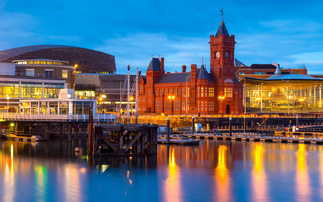The arguments the Trump team is deploying against environmental action are decades old, they need a robust response
Is it possible to be angry, scared, and bored at the same time? There's no need to answer. It is and I am.
I'm angry because President Trump's entirely predictable moves to dismantle US climate policies and open up the market for the world's dirtiest oil look set to obliterate any lingering hopes of keeping global temperature increases below 2C, endangering not just future generations but my own.
I'm scared because the environmental risks Trump is actively working to amplify will provide further sparks to an already tinder-dry geopolitical landscape - a landscape where the new President's every tweet on trade or nuclear weapons or NATO ratchets up the chances of epoch defining conflagration.
But I'm also bored. Bored because all the pro-pollution, planet-disregarding measures Trump is enacting and the incoherent arguments he and his boosters are using to justify their recklessness are about two decades old. We've been here before, we know how this show ends. It's dull, as well as being terrifying.
Trump's exceptionalism encourages us to see him as exceptional. But on environmental issues he is anything but.
Keystone XL, gagging scientists and public officials, tearing down climate policies on the misleading assumption it is bad for business, these are all moves direct from the George W. Bush administration's playbook. Sure, Dubya enacted these policies with considerably more class and decorum (who thought you'd ever read that sentence?), but it is the same end result.
This is one of the many reasons Trump's immediate assault on an environmentalism he believes is 'out of control' is so worrying. There is still a scintilla of hope Republicans in Congress could moderate some of the new President's more extreme national security positions, but there is no sign of them reining him in on environmental issues. Far from it. He is giving the GOP the pollutocrat's wet dream it has long craved.
As frustrating as the environmental policies Trump is preparing to enact are, the intellectually bankrupt arguments he is using to give his actions a veneer of rationality.
The clearly co-ordinated front Rex Tillerson, Scott Pruitt, Rick Perry and others presented as they were quizzed about their stance on climate science was a case in point. In parroting the line that 'no climate change is not a hoax; yes, it is happening and, yes, it is manmade; but we are not sure how big the contribution from mankind or how serious impacts will be', Trump's team present an argument so weak it is a damning indictment of Congress and the world's media that it was not laughed out of Capitol Hill.
As I have argued repeatedly in the past, uncertainty about the precise level of climate risk we face is a terrible argument for curbing efforts to reduce greenhouse gas emissions. It is also an argument we would accept in no other field.
If President Trump was told North Korea may or may not be close to acquiring nuclear weapons, but all the evidence suggests they are close to a breakthrough, his response would not be to approve a shipment of uranium to Pyongyang.
If you had chest pains and your doctor told you it was probably a lung condition, but he couldn't confirm without an X-ray that his insurance didn't cover (let's keep these analogies topical), you would think twice about sparking up a cigarette.
The argument we should temper our response to potentially catastrophic climate change because we cannot be 100 per cent certain about future impacts is so self-evidently flawed it remains genuinely shocking it still enjoys such traction. It is depressing in the extreme that the bar Congress and much of the US media wants the Trump team to clear is whether or not climate change is a "hoax", when the only test that matters is how they are going to respond to the risks climate change presents.
Even an administration as contemptuous of facts and rational discourse as Trump's will not be able to hold this line indefinitely as the realities of climate change mount up and US and global public opinion continues to demand action. Consequently, expect Team Trump to emulate the Bush administration and complement its 'science is uncertain' shtick with a similarly weak 'technology will save us' and 'we can just adapt' narrative. There are signs of this already in the nod to clean coal technology in Trump's America First Energy Plan, but expect to see a lot more talk of new clean and efficient fossil fuel technologies, none of which will be backed by a serious attempt to make CCS a widespread reality.
These narratives will be underpinned by the unwavering assumption that reliance on fossil fuels is inevitable and industry predictions on the continued centrality of high carbon fuel in the global energy mix, such as today's effort from BP, will become self-fulfilling prophecy. A concerted effort will continue to make the carbon emissions that will result from these projections a minor footnote to the real business of continued fossil fuel extraction, like a medical report where the fact the patient has been given six months to live is hidden away in the third page of the appendix.
Faced with these challenges, the green businesses and the environmentalists who the world's most powerful man thinks have too much power cannot afford to be bored by the onerous and potentially dangerous task of repeatedly refuting these reckless and ill-founded arguments.
If there is one lesson to be learnt from Trump's campaign it is that narrow message discipline, even when refracted through the lens of a free-wheeling candidate, delivers results.
So opponents need to stop focusing on who or who doesn't believe climate change is a hoax, and argue repeatedly that the only logical and rational thing to do is to respond aggressively and ambitiously to complex climate risks. And more important still, businesses, investors, and citizens need to invest whatever political capital they have in hammering home the point that clean technologies work, deliver multiple benefits, and can and will outperform the dirty technologies of the 20th century.
The auto manufacturers who met with Trump this week have to have the nerve to say that actually the emissions standards he derides help deliver the electric cars they are investing billions of dollars in. Theresa May needs to politely make clear that the international community will outcompete the US in developing the clean technologies of the 21st century if the US vacates its leadership position. The jobs and 'crystal clear' air and water Trump promised are there to be realised, but the new President seems committed to squandering this opportunity in a smog of his own making.
Since Trump's inauguration I can't stop thinking about the late US Secretary of Defense Robert McNamara and the 2003 documentary about his life The Fog of War. McNamara was one of the architects of both the fire-bombing of Japan during the Second World War and the Vietnam War. In the film he reflects at length on his life and the lessons he has learned about war, geo-politics, and government. It never quite becomes a mea culpa, but his defence of what he accepts would likely have been war crimes had the other side won, coupled with his honest assessment of the mistakes that were made in nearly pushing the world to nuclear Armageddon and his growled advice that "the human race needs to think more about killing" is as powerful appraisal of the daunting responsibility of government as you will see.
Trump's fellow travellers don't seem the types who would welcome McNamara's doctrines of proportionality, respect for data, and frequent re-examination of your reasoning, but you can't help but wonder if in 30 years' time some of the leading lights of the global pollutocracy will have the self-awareness to sit down with a camera and ask why their projections were so flawed and how close to catastrophe it brought us.
The responsibility of green businesses everywhere is to now redouble efforts to ensure such an historical exercise is an examination of why the Trump White House did not see the low carbon revolution coming, not an assessment of how the fog of pollution drove the global economy towards the climate crisis the fossil fuel community is today insouciantly predicting.









